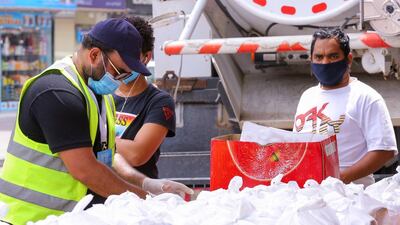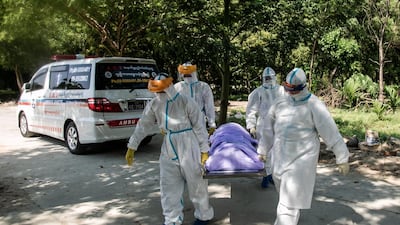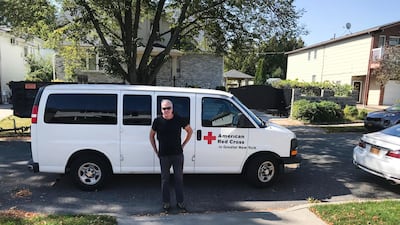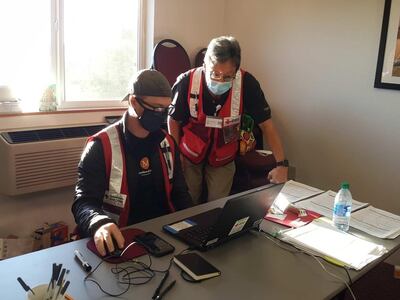For many, 2020 has been a year of tragic coronavirus deaths, wildfires, wars and political divisions. Despite this gloomy backdrop – or perhaps because of it – ever more people have signed up to help repair the damage.
As Covid-19 tore across borders and infected millions, huge numbers of people donated blood plasma, took part in vaccine trials or found time to assist those left homeless or destitute amid the pandemic.
Buddhist nuns have delivered aid to remote Himalayan villages. Restaurateurs provided 500,000 free meals in downtown Dubai.
The Red Cross has reported hundreds of thousands of new sign-ups globally, including 78,000 in the United States.
Among them is Alan Henzy, who joined the charity in September. He was promptly sent to Oregon, where wildfires killed 11 people and destroyed thousands of homes in towns that had already been hit by the pandemic.
"People are seeing the crazy stuff that's going on and they want to do something," Mr Henzy told The National. "I can't stop Covid or make a vaccine but I can help out Bob Smith in Oregon whose house just burnt down."
The 28-year-old student described a mixture of motivations: an inbuilt desire to help, witnessing suffering in the world, a warm glow from the appreciation of others and a healthy measure of adventurism.
He spent two weeks helping to provide those rendered homeless with money, meals, hotel rooms and any medicines they had lost in the blaze. It made him feel “privileged” for living a comfy, calamity-free life.
“It was the closest I've ever come to this much trauma – 200 people, every single one of whom had a heartbreaking story of losing homes they had lived in for years, all burnt down and they had to start over again,” said Mr Henzy.
“I tried to empathise but how could I? I’ve never been through anything like that.”
Meanwhile, Bill Chrystal, 59, signed up with the Red Cross in January as the pathogen was crossing continents. He now drives around New York helping people who have lost their homes, often due to fires or building safety evictions.
The married father-of-two worked for decades in software development and finance. Since retiring, he volunteers at a community garden, an oyster-seeding project and other deeds to “make people happy”, he said.
“After 35 years on Wall Street, I feel I have a lot to atone for,” quipped Mr Chrystal.
Last month, after a blaze ripped through a four-storey Bronx apartment block, he drove his Red Cross van to help the mostly poor, immigrant families who had just lost everything get food and lodging for a few nights.
Volunteering, he learnt, was surprisingly complicated. Joining the Red Cross involved interviews and background checks and felt more like a regular job interview than offering one’s time gratis.
“It’s not like going to a soup kitchen and working out where the bowls and ladles are,” said Mr Chrystal.
“There’s people, processes and technology that you have to learn and implement in the field under some pretty tough conditions.”
Mr Chrystal and Mr Henzy are just two examples of people working for free in a pandemic that has infected more than 70 million people globally, killed almost 1.6 million, shuttered economies and left millions jobless.
The trend extends beyond the US northeast. The Red Cross notes a “surge” in volunteers from Kenya to Kyrgyzstan, with volunteers transporting medication and face masks, contact tracing, counselling the quarantined and other good deeds.
Francesco Rocca, president of the charity’s international federation, said Covid-19 had been met with “unprecedented humanity and kindness” and volunteers were a “light among the darkness”.
A UN scheme has 110,000 volunteers across 100 countries web-surfing for fake news about the pandemic – everything from bogus science to posts attacking minority groups for the virus – which are reported and corrected.
Tracy Kyomuhendo, a student in Kampala, Uganda, joined the Red Cross in March after lockdowns suspended her studies. She wanted to help neighbours, she said, many of whom “didn’t even think coronavirus was real”.
Stories come from far and wide. A group of maroon-robed Buddhist nuns, known as the "Kung Fu nuns" for their martial arts training, trek along the India-Nepal border carrying vital aid and health advice to villagers left destitute and sick by the pathogen.
In Yangon, Myanmar’s virus-ravaged commercial hub, Muslim volunteers spend their days collecting bodies of Covid-19 victims from overflowing hospitals. Without their efforts, the cadavers would be cremated, which is forbidden in Islamic law.
In the UAE, thousands of volunteers and restaurateurs delivered free meals to people who had been hit by the pandemic. Sheikh Abdullah bin Zayed, Minister of Foreign Affairs, said such endeavours bolstered the “social fabric between Emiratis and residents”.
On International Volunteer Day on December 5, UN Secretary-General Antonio Guterres, said volunteers were the “backbone of our societies” during the pandemic.
Back on New York’s leafy Staten Island, Mr Chrystal is enjoying the festive season with his family – but is ever ready to jump in his van and respond to the next house blaze, which are more common in colder months when electric heaters are switched on.
The pandemic has been the “largest public health crisis in 100 years”, he said. As the US, China and others row about the origin of the virus and as rich nations hog vaccine supplies, everyday Samaritans the world over can make a difference.
“We’ve already got Covid fatigue in New York and we know the city is in for a brutal few weeks and it’s going to get a lot worse before it gets better, but you just gotta keep saying that there’s light at the end of the tunnel,” said Mr Chrystal.








